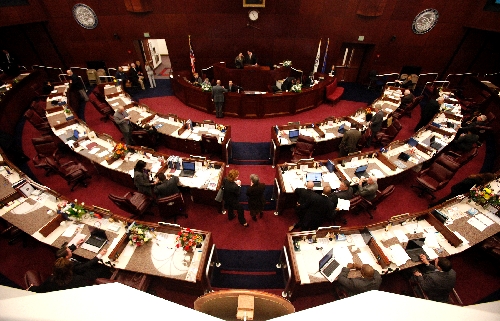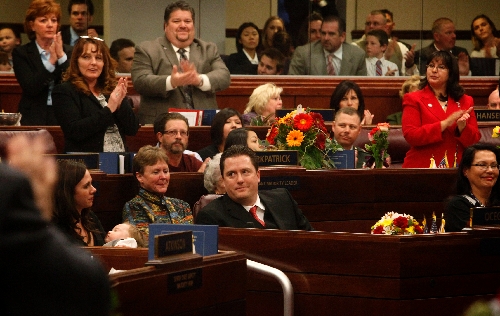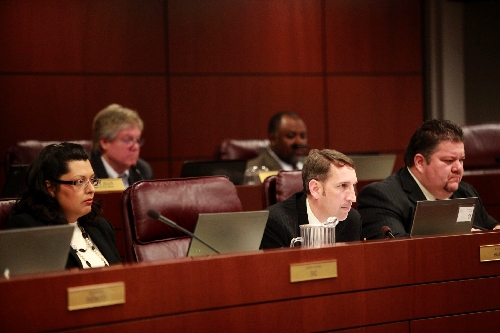Power play: State’s separation of powers doctrine effectively ignored
Why are there so many executive and judiciary branch government employees serving in the Legislature? Article 3, Section 1 of the Nevada Constitution states, "The power of the government of the State of Nevada shall be divided into three separate departments; the legislative, the executive and the judicial; and no persons charged with the exercise of powers properly belonging to one of these departments shall exercise any functions appertaining to either of the others except in cases herein expressly directed or permitted."
The first reason is often overlooked: The nature of their jobs makes it easy.
So happy are government department heads, at any level, to have "one of theirs" in the Legislature -- where lawmakers can carry bills favored by their bosses, block bills opposed by their bosses and at the very least keep their bosses posted on what's happening -- that it was long routine for the legislator/public employee to collect full government pay, with no loss of benefits or seniority, while also drawing a legislative salary. Few private-sector workers could count on such employer largesse -- or even assume their job would be waiting for them on their return. And for someone who actually owns and operates a full-time private business, with the possible exception of seasonal agriculture, taking five months off to attend a legislative session is almost unthinkable.
In fact, many lawmakers who had private-sector jobs when they first ran for office were hooked up with curious new jobs invented just for them, which allows a government entity or another powerful special interest to, for all practical purposes, buy and own a legislator.
The second reason such people are allowed to "serve" in Carson City, of course, is that the public employee unions finally got to our state attorneys general, convincing them that this provision of the state Constitution need no longer be meaningfully enforced.
As the "separation of powers" provision was understood from 1864 until at least 1964, no teacher or other employee retained or employed by a government school or college or university that receives substantial state money, no police officer or firefighter -- no one who works for any other branch of government at any level or in any capacity -- was allowed to hold elected public office in Nevada, and especially not seats in the Legislature.
"The concentration (of the powers of government) in the same hands is precisely the definition of despotic government," wrote Thomas Jefferson in 1782. "It will be no alleviation that these powers be exercised by a plurality of hands, and not by a single one. One hundred and seventy-three despots would surely be as oppressive as one."
In 1952, then-Nevada Attorney General W.T. Mathews, a Democrat, told state Sen. John Murray of Eureka County that he couldn't continue working for the Department of Motor Vehicles while serving as an elected lawmaker. "Executive class includes all persons who have functions in the administration of public affairs," Mr. Mathews wrote.
Two years later, Mr. Mathews told two other elected officials from Eureka County who held jobs with the Nevada Highway Department the same thing: "We think such practice would ignore if not in fact be violative of the above quoted constitutional provisions."
So far so good.
Nevada's next attorney general, Harvey Dickerson, a Democrat, initially saw the provision the same way. He ruled a member of the state Assembly could not at the same time hold a position in local government. Because counties, cities and school districts are creatures of the state, he wrote (citing some of the same precedents as had Mr. Mathews), an assemblyman could not also receive remuneration as an employee of the Hawthorne Elementary School District.
"The school districts are political subdivisions of the state government and part of the executive branch," Mr. Dickerson wrote. "An employee of the school district is exercising a function appertaining to the executive branch. If that employee is at the same time an assemblyman, the activity is in conflict with the above quoted constitutional provision."'
Mr. Dickerson noted legislative service is not really just a few months every two years; a lawmaker can be called into special session at any time and frequently serves on interim committees "all during his two-year term."
The question was raised whether the assemblyman's school district job -- janitor -- really constituted a "public office." The attorney general responded that the separation-of-powers prohibition specifically applies to mere employment in one branch of government if the person exercises powers in another.
But in 1967, for reasons never disclosed, Mr. Dickerson changed his mind, holding a local fire chief (from the city of Sparks) could serve as a state senator.
And by 1971, under newly elected Attorney General Robert F. List, the lid was blown off the separation doctrine completely, with Mr. List holding you could "exercise powers" as a legislator so long as you didn't "exercise powers" in one of the other branches -- in essence, so long as you "just worked there."
In 2004, Attorney General Brian Sandoval -- now our governor -- issued an opinion holding that state workers should not be allowed to sit in Carson City. But it has never been tested in the courts and is widely ignored.
In effect, this means virtually any government employee short of the governor and a few other statewide elected officials could probably serve simultaneously in the Legislature -- and that legislators, once elected, can be offered jobs and thus "captured" by virtually any government agency at any level -- something that now happens with some frequency.
Thus was the protection destroyed, leaving Nevadans in a position where our employees are now our bosses, voting themselves largess from our checkbooks.
Back in January 2003, Steven Miller of the Nevada Policy Research Institute wrote: "The successful neutralization of the Nevada Constitution's separation-of-powers clause increasingly gives citizens of the Silver State a skewed and distorted political system. People who are supposed to be our employees now increasingly write the laws and tell the rest of us what to do. In the 1999 Nevada Legislature, 44 percent of the members of the state legislature -- 28 of 63 -- also held government jobs or were married to government employees. In the 2001 Assembly, a public employee occupied every position of power:"
Back in 1999, Assembly Speaker Richard Perkins was a Henderson deputy police chief; Majority Leader Barbara Buckley was executive director of Clark County Legal Services; Morse Arberry, who chaired the powerful Ways and Means Committee, was a neighborhood services administrator for the city of Las Vegas; Wendell Williams, chairman of the Education Committee, was a management analyst (whatever that is) for the city of Las Vegas, and Clark County School District teacher Chris Giunchigliani chaired the Elections, Procedures & Ethics Committee.
"Such concentration of state power among public employees is a major reason why Nevada taxes and fees have gone up virtually every biennium over at least the past 22 years," Mr. Miller noted.
Term limits or re-election losses ended the legislative careers of all those above-named lawmakers -- though Giunchigliani is still on the scene as a Clark County commissioner running for mayor of Las Vegas.
So what about Carson City today?
In attempting to update Mr. Miller's statistic -- 44 percent of the members of the 1999 state legislature, 28 of 63, holding government jobs or married to government employees -- what's most amazing is that he could settle on a fixed number.
Often, there's not as clear a line to be drawn as we might first imagine.
Go to the Assembly or state Senate pages of the Legislature's website. Open the biography of Las Vegas state Sen. Moises "Mo" Denis, D-Las Vegas. It will tell you he's a "computer network technician."
Almost certainly a private-sector job, right? Since his election to the Legislature he's begun doing his computer work for ... the state Public Utilities Commission.
Check out Reno Republican Ben Kieckhefer. It says he's in "communications." Radio, TV, public relations, whatever that means, at least he's not an employee of the executive branch of state government ... where he's spent most of the past three years as press secretary for Gov. Jim Gibbons and the state Department of Health and Human Services.
Mr. Kieckhefer promised to resign his government job if elected to the Legislature, and he apparently did so. I called the Kieckhefer home last week to ask what the senator is doing now. Although he's not a lawyer, he now works for the Reno law firm of McDonald Carano Wilson, established in 1949 by U.S. Sen. Alan Bible, which recently produced District Court Judge Deborah Schumacher, among others. So that's not a government agency, though it's clearly an outfit that's been capitalizing on its government connections for 60 years.
Would Mr. Kieckhefer hold his "day job" there if he didn't hold a legislative seat?
Nonetheless, we'll list Sen. Denis as a government employee, and Sen. Kieckhefer as a private-sector worker.
Other than Sen. Denis, what current members of the Legislature would clearly be barred from "double-dipping" if Article I, Section 3 were enforced today as it was from 1864 to 1964?
Sen. Ruben Kihuen, D-Las Vegas, is a diversity programs manager at the College of Southern Nevada, a state college. Sen. Sheila Leslie, D-Reno, is a specialty court coordinator in the judicial branch, up north.
Assemblyman Steven Brooks, D-Las Vegas, works for the city of Las Vegas as a "City Council liaison." In fact, it was the threat that he might have to take a leave of absence from that job (oh, the horror) to run for the Assembly that led fellow Assemblyman Tick Segerblom, D-Las Vegas, to submit a bill this session to make sure no government employee will ever be so inconvenienced, again.
Assemblyman Marcus Conklin, D-Las Vegas, lists on his 2011 financial disclosure form two sources of income: Prime Contracting Inc. and the College of Southern Nevada. As he failed to return numerous phone calls and emails seeking clarification of what he does for the state college and how much he's paid, we'll list him as a government employee.
Olivia Diaz, D-North Las Vegas, is a government elementary school teacher.
Assemblywoman Lucy Flores, D-Las Vegas, who until recently was active in UNLV's diversity police, graduated from Boyd Law School but does not appear to be a lawyer; her web page now lists her as the principal of Latina Strategies. She did not return phone calls seeking clarification on her income sources, but her financial disclosure report, filed with the secretary of state Jan. 18 of this year, lists her sole source of income as "Nevada System of Higher Education." And her page on the networking website Linkedin says she's the higher education system's "College Access Grant Coordinator." We must assume she remains a government employee.
Scott Hammond, R-Las Vegas, is also a Clark County teacher, as is Melissa Woodbury, R-Las Vegas, daughter of former County Commissioner Bruce Woodbury. John Oceguera, D-Las Vegas, is a North Las Vegas assistant fire chief. Assemblyman Jason Frierson, D-Las Vegas, is a Clark County deputy public defender.
Assemblywoman Dina Neal, D-North Las Vegas, daughter of former state Sen. Joe Neal, lists herself as a "contract administrator and adjunct professor." According to her financial disclosure report, she works for former City Councilman Frank Hawkins Jr.'s "Community Development Programs Center of Nevada," which rents its premises from a firm owned by Frank Hawkins Jr., and whose board of directors -- prominently featuring Frank's mom -- "constantly scrutinizes" this nonprofit's relationship with Mr. Hawkins' construction firm, which serves as general contractor on all their low-income housing projects.
Lots of government money there. But does Assemblywoman Neal hold a government job? Her 2011 financial disclosure form lists "College of Southern Nevada" as a second income source. Adjunct professors usually don't make a lot, but the form says "Yes."
Then there's Assemblyman Kelvin Atkinson, D-North Las Vegas, who could be featured on the poster for government employees serving in the Legislature.
On April 28, Mr. Miller of NPRI briefly summarized Mr. Atkinson's recent employment history:
"In late 2003, Clark County fired Mr. Atkinson from his position as a parks department management analyst. His supervisors had learned that the assemblyman, during a special legislative session, had been claiming sick-leave pay for days in Carson City when he was also voting on tax bills, eating Chinese food with other legislators and drawing a legislative salary."
The Review-Journal reported in 2003 that Mr. Atkinson continued insisting publicly that he had indeed been sick. However, a transcript of the lawmaker's appeals hearing that same month with the county human resources director raised new doubts.
"I made a serious error in judgment when I requested sick time rather than vacation time during the legislative session," Mr. Atkinson told the human resources director. "I wish I could go back and change that, but of course, I cannot."
In May 2004, however, testifying before an arbitrator, "Atkinson was again claiming he'd been sick on the days in question," Mr. Miller points out. Arbitrator Ronald Hoh then ordered Clark County to reinstate Mr. Atkinson and award him back pay.
Thom Reilly, then Clark County's manager, called Mr. Hoh's decision "mind-boggling. ... The message is, if you can hide it and keep it from your supervisor, you're fine."
Supporting witnesses for Mr. Atkinson before the arbitrator, the assemblyman told the Review-Journal, had been fellow Assembly members John Oceguera and Morse Arberry. Both backed Mr. Atkinson's statement that he had been ill.
"Oceguera today, of course, is the Assembly speaker," Mr. Miller notes, "as well as a member of the Commerce and Labor Committee. He also is a deputy fire chief for the North Las Vegas Fire Department and, as such, a recurring subject of questions about whether he would even be in the Legislature if Article 3 of the state constitution -- its separation-of-powers provision -- were enforced."
Thirteen direct government employees out of 63 legislators sounds like a considerable reduction in such concentrations of power, with the conflicts of interest such "double-dipping" always bring down to a mere 20 percent.
But there are a lot of gray areas, from lawmakers with spouses who work for the government to retired government employees drawing state pensions, who have an obvious conflict when the Legislature regularly votes to pump in current tax revenues to shore up the underpinnings of the Public Employees Retirement System. One old legislative hand calls it "the subtle, complex interplay between state and local government, given Nevada's lack of home rule, which gives guys who've been in local government for years and years, when they go to the Legislature, a tendency to be more sympathetic to government than to the taxpayers. The key 'tell' is that they join the Nevada Association of County Organizations."
As examples, consider four current Assembly Republicans: 16-year Eureka County Commissioner Pete Goicoechea; longtime Elko City Councilman and County Commissioner John Ellison; former 12-year mayor of Yerington Tom Grady; and Cresent Hardy, who served five years on the Mesquite City Council after working seven years as director of public works for the city of Mesquite.
Mr. Ellison lists himself as an electrical contractor. Mr. Goicoechea is a rancher. Tom Grady describes himself as a retired banker. Mr. Hardy is a general engineering contractor. Article 3, Section 1 would not bar any from serving.
Then there's 12-year Douglas County Commissioner Kelly Kite and 12-year Carson City Commissioner Pete Livermore, both Assembly Republicans.
Sen. Shirley Breeden, D-Henderson, is a retired teacher living on a PERS pension.
Sen. David Parks, D-Las Vegas, is presumably drawing a similar 70 percent pension after a 30-year government career that saw him rise to become assistant director of the Regional Transportation Commission.
Assemblyman Paul Aizley, D-Las Vegas, recently retired as a math professor at UNLV; his wife had a career with the Clark County School District and now works part-time putting out a publication for the faculty alliance.
Assemblywoman Teresa Benitez-Thompson, D-Reno, Miss Nevada 2002, is a licensed social worker, working in the private sector for a hospice care provider. Her husband "currently serves the Silver State as Assistant Nevada State Climatologist," according to her website, though her official 2011 financial disclosure form reports household income from the "Nevada System of Higher Education."
After moving to Reno in 1997, Democratic Assemblyman David Bobzien "began working at the University of Nevada, Reno as a program assistant and management analyst in the planning, budget and analysis office where he gained a knowledge of state education policy and budgets," according to his official biography. "David was appointed Campus Webmaster in 2000, where he worked with emerging Internet and education technologies until 2007," but he now "owns a small Web design business." He called me back to report he now has no government contracts.
Assemblywoman Maggie Carlton, D-Las Vegas, a former Culinary union shop steward, now works for the Great Basin Primary Care Association, promoting health care for the poor. A lot of government grant money there, but technically a nonprofit corporation. Her husband is a longtime state parole and probation officer; her financial disclosure form reports household (but not personal) income from "state of Nevada."
Assemblywoman Marilyn Dondero Loop, D-Las Vegas, daughter of former County Commissioner and Regent Thalia Dondero, draws a pension as a retired schoolteacher. She also lists herself as an "education consultant." She states she has never drawn any further pay from the district since retiring. Her 2011 financial disclosure form, filed with the secretary of state, reports income from PERS -- the state retirement system -- and from one other source, listed only as "Pearson." Pearson Higher Education is a huge textbook publisher. Would her old colleagues in the school district have any incentive to throw business in the direction of this employer, given that she has a vote on their state funding allocations?
I asked her about income as a textbook saleswoman in an email. So far, no reply.
Assemblyman John Hambrick, R-Las Vegas, is retired after a multi-agency career with the Secret Service, the federal Inspector General's office and the Nevada Board of Osteopathic Medicine. He presumably draws one or more government pensions, as does Assemblyman Joe Hogan, D-Las Vegas, a retired federal official.
Assemblyman Harvey Munford, D-Las Vegas, is a retired teacher, as is Assemblyman Lynn Stewart, R-Henderson.
I haven't looked into lawmakers whose jobs -- some created for them after they won elected office -- make them beholden to the unions, to big developers, to the insurance companies or trial lawyers or the gaming industry, most of whom adopt a "tax anyone but me" philosophy.
Maybe next time.
Vin Suprynowicz is the Review-Journal's assistant editorial page editor.






























